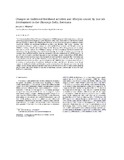| dc.contributor.author | Mbaiwa, J.E. | |
| dc.date.accessioned | 2011-05-31T12:17:18Z | |
| dc.date.available | 2011-05-31T12:17:18Z | |
| dc.date.issued | 2010-09-05 | |
| dc.identifier.citation | Mbaiwa, J.E. (2011) Changes on traditional livelihood activities and lifestyles caused by tourism development in the Okavango Delta, Botswana, Tourism Management, Vol. 32, No. 5, pp. 1050-1060 | en_US |
| dc.identifier.other | doi.10.1016/j.tourman.2010.09.002 | |
| dc.identifier.uri | http://hdl.handle.net/10311/805 | |
| dc.description.abstract | The Community-Based Natural Resource Management (CBNRM) program in Botswana aims at achieving
conservation and rural development. In the Okavango Delta, some communities are involved in tourism
through CBNRM to improve their livelihoods. However, research has not adequately analyzed changes
caused by CBNRM on traditional livelihood activities and lifestyles. This study, therefore, uses
modernization theory to analyze changes on traditional livelihood activities and lifestyles caused by
CBNRM at Sankoyo, Mababe and Khwai villages in the Okavango Delta. Using primary and secondary data sources, results indicate that CBNRM is causing a decline in traditional livelihood activities like
subsistence hunting, gathering, crop and livestock farming. As a result, a modern cash economy has
emerged. New livelihood activities done by communities include: employment in CBNRM projects, the sale of crafts to tourists and thatching grass to tourism lodges. Income derived from CBNRM affords
households to build modern houses, buy foreign foods and household equipment like: four-burner gas stoves, kitchen utensils, and satellite televisions. Conversely, this causes a decline in the consumption of traditional foods and the use of huts and household utensils. CBNRM is thus a modernization tool since it is causing a transformation of traditional livelihood activities and lifestyles. However, even though changes in livelihood activities and lifestyles may be an indication of the dynamism of culture in study villages, sudden change and modernization may increase livelihood insecurity. As such, tourism planning should ensure that modernization is sensitive to traditional economic systems and the need for rural livelihood sustainability. | en_US |
| dc.language.iso | en | en_US |
| dc.publisher | Elsevier | en_US |
| dc.subject | Livelihood activities | en_US |
| dc.subject | Modernization theory | en_US |
| dc.subject | Community-based natural resource management | en_US |
| dc.subject | Tourism development | en_US |
| dc.subject | Okavango Delta | en_US |
| dc.title | Changes on traditional livelihood activities and lifestyles caused by tourism development in the Okavango Delta, Botswana | en_US |
| dc.type | Published Article | en_US |
| dc.link | http://www.sciencedirect.com/science?_ob=ArticleURL&_udi=B6V9R-513DYWV-1&_user=778200&_coverDate=10%2F31%2F2011&_rdoc=1&_fmt=high&_orig=gateway&_origin=gateway&_sort=d&_docanchor=&view=c&_acct=C000043160&_version=1&_urlVersion=0&_userid=778200&md5=39edc17eaca9615c937772e08adeb49c&searchtype=a | en_US |

